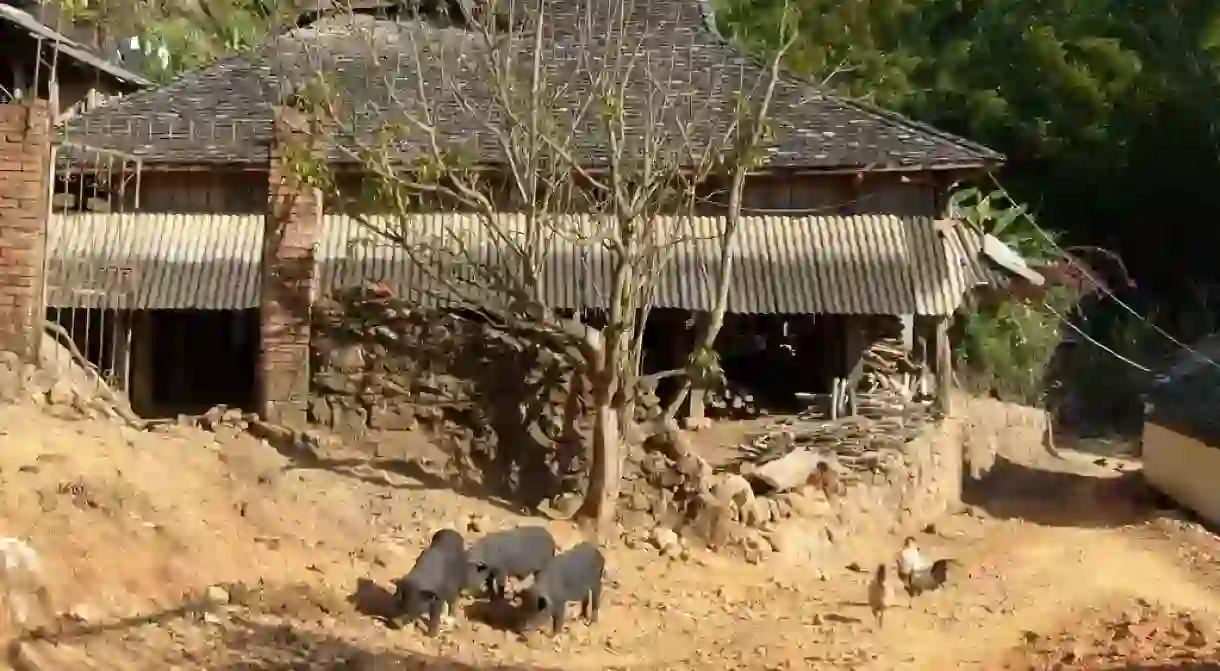An Introduction to China's Blang People

The Blang, or Bulang, are one of China’s 56 officially recognized ethnic groups. They live in the mountains of southern Yunnan province, where they have long intermixed with the Dai.
Homeland
The largest concentration of Blang live in Menghai County, a small jurisdiction of Xishuangbanna Dai Autonomous Prefecture in the extreme south of Yunnan province on the border of Myanmar. Harboring much of the biodiversity of Yunnan, Xishuangbanna is home to rainforests, rare plants and the last few Asian elephants in China.
The Blang live at high altitudes and practice agriculture, cultivating primarily rice, cotton, sugar cane, and Pu’er tea in the rich soils of this tropical environment. Their small villages are scattered across lands populated more heavily by the Dai and Han, from whom the Blang have adopted certain cultural traits.

History
The Blang are descendants of the ancient Pu, or Lolo people, from whom the Wa and De’ang are also believed to have derived. Together, the three people groups are considered to be the indigenous peoples of southwestern Yunnan.
During the Ming dynasty, the Blang came under the Tusi, or “chieftains” system, whereby hereditary tribal leaders were appointed by the imperial court to rule locally on behalf of the central government. Under this system, many smaller ethnic groups suffered at the hands of the larger and more powerful peoples. In the case of the Blang, the Dai became their direct overlords, imposing taxes and customs on them and greatly changing their way of life.
It was during this time that the Blang began farming, having previously relied on hunting for their livelihood. Many of them also took up Theravada Buddhism, the primary religion of the Dai.
https://www.instagram.com/p/BLCjRttgxCY/?tagged=%E5%B8%83%E6%9C%97%E6%97%8F
Culture
The Blang in Xishuangbanna have been the most influenced by the Dai, to this day sharing many culturally similarities with them. For example, the Blang in the area still practice Theravada Buddhism, while those located in other parts of Yunnan have maintained many of their animistic and shamanistic beliefs. The Xishuangbanna Blang also adhere to the Dai calendar, celebrating the new year on the same day as the Dai celebrate their Water Splashing Festival. The Blang, however, do not take part in the festivities.
Among the Xishuangbanna Blang, a unique cultural tradition also prevails, namely that of teeth dyeing. Between the festivals of the Closing of the Doors and Opening of the Doors, Blang youth dye their teeth with wood, betel nuts, or chewing tobacco in a display of maturity and readiness for love.
The Blang speak two primary languages, Blang and U, which belong to the Mon-Khmer branch of the Austroasiatic language family. The languages have no native written counterparts but instead have adopted a Latin script. Today, most Blang can also read and write Mandarin.
Blang society is divided into small clans, each owning its own land populated with bamboo houses. Most Blang do not have surnames, though most men’s names begin with Yan and most women’s with Yu. Children are named by the maternal grandfather or other respected elder in the clan. The name must be chosen in accordance with certain rules. The name is typically a combination of a prefix based on gender and birth order and a suffix made up of the second syllable of the mother’s name.
https://www.instagram.com/p/xM9LF7xMrU/?tagged=%E5%B8%83%E6%9C%97%E6%97%8F













